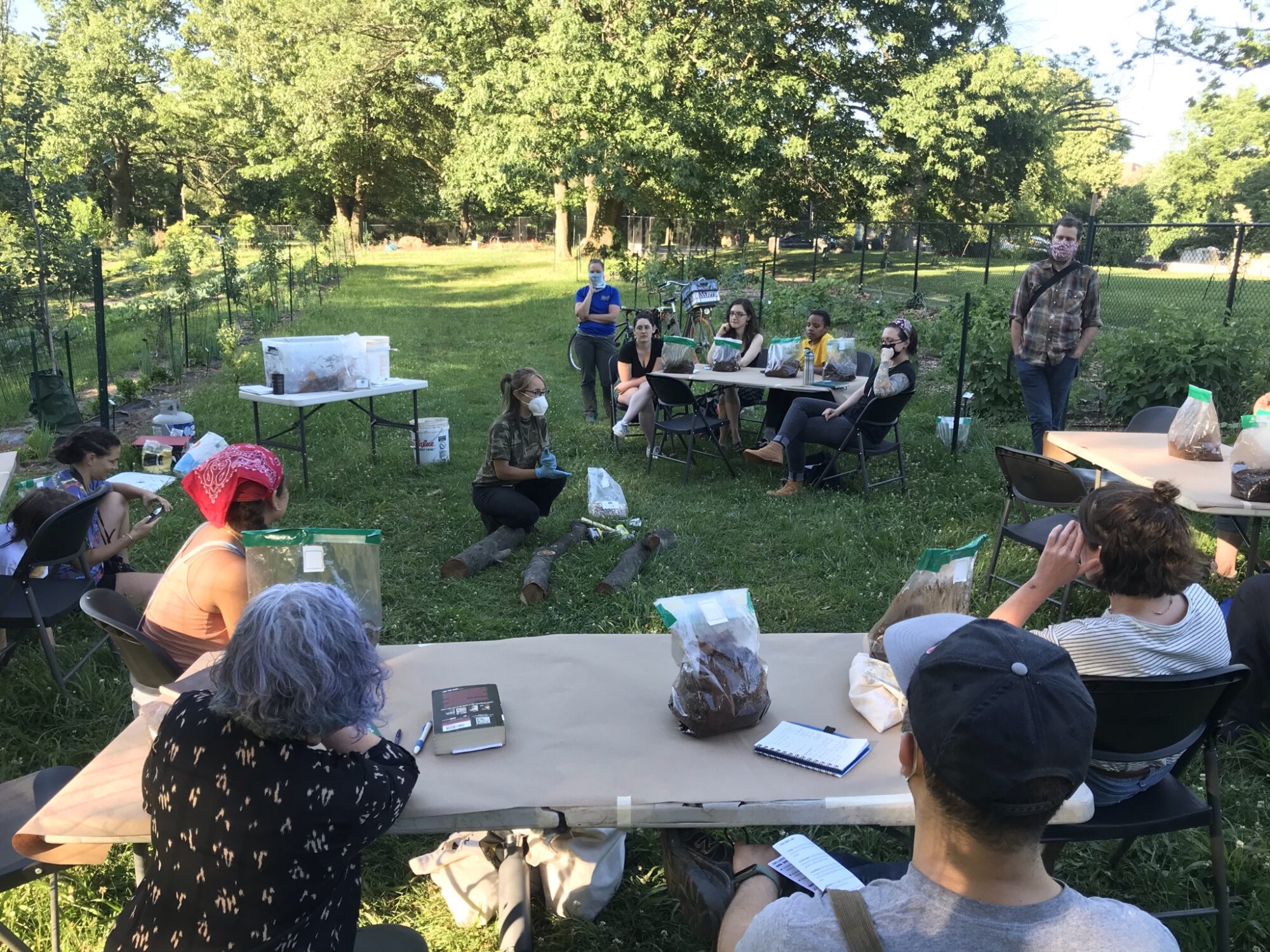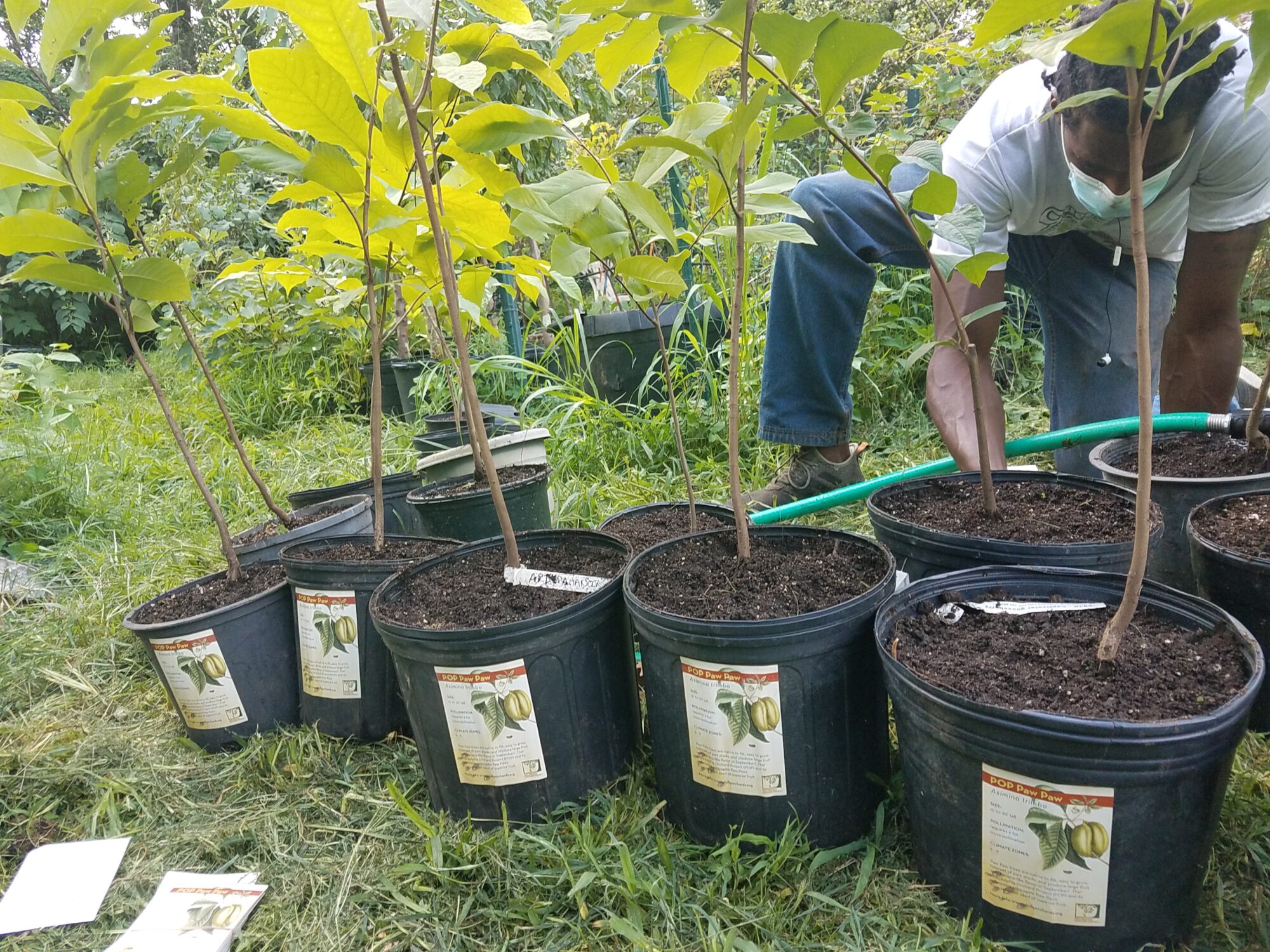Background and Introduction
Since we first began our work nearly 16 years ago, the Philadelphia Orchard Project (POP) has inspired community-driven approaches to solutions in food justice and sustainability. Our dedicated team, along with our volunteers and partners, plants and supports community orchards across Philadelphia to develop a more sustainable, equitable, and ethical local food system. Despite our presence in many neighborhoods and 24 different zip codes across the city, many remain unfamiliar with POP’s work. In this post, we share some context and history along with an overview of the current programs and services that POP offers to our partners, volunteers, and the general public which we hope will leave the reader better acquainted with our organization and programs. An upcoming blog post will provide more detail about our diversity, equity, inclusion, and justice-driven strategic plan goals and how we intend to continue growing our organization’s programs and impact in the years to come.
Since our founding in 2007, POP has planted more than 60 community orchards – 30 of which are on city-owned land – and currently works with 68 partners throughout the city, concentrated in the neighborhoods of Mantua, Belmont, Fairhill, Poplar, Wharton, Kingsessing, and Strawberry Mansion. Current community partners include schools, houses of worship, community gardens, urban farms, housing centers, and a wide range of nonprofits. Our flagship demonstration orchard and education hub, the POP Learning Orchard, was established in 2020 and is located in The Woodlands in University City. In the first few years, POP planted up to 6 new orchards per year, but this rate of growth was not sustainable because we realized that most orchard partners relied on ongoing access to our perennial plant expertise. Now, POP typically plants 2 to 4 new community orchards each year while regularly expanding and maintaining existing sites.

Current POP Programs
POP works to nurture beautiful, green food-producing spaces that sustain ecosystems, connect neighbors, provide hands-on learning experiences, and grow fresh fruit for generations to come. Through our Orchard Planting and Orchard Education programs, POP assists partners with ongoing orchard maintenance, including the sites on city-owned land, providing seasonal hands-on training opportunities to promote orchard health and yields and recruiting additional volunteers when needed. We provide thousands of dollars worth of plant materials and thousands of hours of staff time each year to help partners maintain their orchards by helping to identify and address pests, diseases, or other factors that would otherwise interfere with a productive harvest. We run classes like POPCORE, an urban orchardist certification course, and coordinate a Lead Orchard Volunteer program, where volunteers receive seasonal stipends to help manage the work at their orchards and learn more about how to be a responsible orchard steward. POP also publishes educational blog posts, produces orchard care videos, creates plant spotlights, maintains an email list, and offers in-person classes, making orchard education accessible to all.
POP grows thousands of pounds of food at the Learning Orchard and donates it to neighborhood mutual aid partners such as Food Not Bombs and The People’s Fridge. This year, in 2023, two high tunnels will be constructed at POP’s headquarters. These will allow POP to increase its food production and climate-adapted plant propagation at our nursery, thereby further contributing to improving the city’s food resources. In the years to come, POP will prioritize plants that thrive in the Philadelphia region and will be resilient in a changing climate, and advocate for policies that advance environmental justice and help protect our planet from climate catastrophe. We also provide opportunities for gleaning: the harvesting of food from publicly-planted trees such as juneberries and mulberries, which would otherwise go to waste, though the POPHarvest program. We offer dozens of orchard care and harvest use workshops throughout the year, taking place at sites across the city to reach residents where they are, providing workshop sites hosts and community educators
POP’s Partnership on City Initiatives
Since POP was first formed, we have worked alongside the City: giving away fruit-bearing trees as part of TreePhilly; creating educational resources about fruit tree care and harvest use; engaging residents in volunteer tree stewardship; and planting community orchards on City-owned land at recreation centers, schools, parks, historic sites, and transit centers. POP’s programs, core values, and partnerships align with more established plans and recommendations adopted by the City, such as Greenworks Vision for a Sustainable Philadelphia. Our focus on helping create orchards in underserved neighborhoods aligns with the Philadelphia Food Policy Advisory Council’s Food Policy Recommendations, which prioritize equitable access to fresh local food and ownership of land by marginalized communities. Finally, we support the Livable Communities Action Plan championed by AARP-PA and adopted by the City in 2020 and are working to advance access to green spaces and engaging programs.
A growing number of guiding documents that reach across departments, including the City’s new Urban Agriculture Plan: Growing from the Root and Philly Tree Plan, outline approaches grounded in equity and inclusion. POP is cited in both plans as a nonprofit partner of City government and is included in many of the plans’ implementation strategies. With approximately 74% percent of the 68 orchards and food forests supported by POP located in low-income neighborhoods across the city, our organization is well placed to deliver on these environmental justice goals.

Former Orchard Director Alkebu-Lan Marcus in August 2020, preparing paw paw trees for the TreePhilly fall giveaways.
How POP Funds Our Work
All of POP’s programs are offered on a sliding scale, with no one turned away for lack of funds, with ongoing operations supported by grants, individual donations, corporate supporters, and program fees. We are grateful to the hundreds of individuals who make donations each year through our annual campaign and tree certificate campaigns, as well as the 50 sustaining monthly donors whose ongoing contributions help to support our operating costs. The majority of POP’s funding has traditionally been granted through local and regional foundations, including recent or current contributions from the William Penn Foundation, Claneil Foundation, Leo & Peggy Pierce Family Foundation, Impact100, and the Junior League of Philadelphia. More recently, POP has been supported by the Pennsylvania Department of Agriculture, the Philadelphia Food Justice Initiative, and CHOP’s Healthier Together program. In 2023, POP will receive City funding for the first time to better resource our staff and programs. This is a big milestone for POP, given that we have been providing our services at little to no cost to partners, including many groups working on City-owned sites, since the organization was first founded. POP provides support to our community partners through orchard work days, hands-on training, and volunteer coordination; grows and provides plant materials through our edible plant nursery, and coordinates and distributes ecological orchard care supplies; and regularly develops and distributes printed and online orchard care materials. Funding from the City will support POP staff time to plan and carry out orchard work days at sites located on City-owned properties; the development of additional educational opportunities for TreePhilly recipients who plant fruit trees in partnership with Philadelphia Parks & Recreation and the Fairmount Park Conservancy; the translation of orchard care videos into Spanish; and for better resourcing of POP’s nursery and annual crop production at the Learning Orchard.
This edition of the POP blog prepared by co-executive director Kim Jordan, who can be contacted at kim@phillyorchards.org with any questions.
SUPPORT US! If you found this entry useful, informative, or inspiring, please consider a donation of any size to help POP in planting and supporting community orchards in Philadelphia: phillyorchards.org/donate.